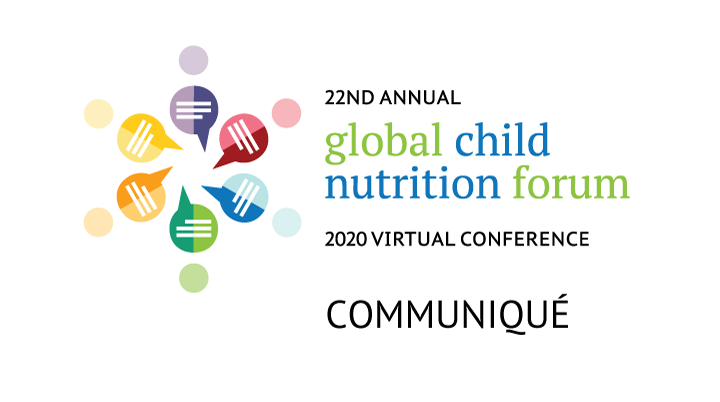
The 2020 edition of the Global Child Nutrition Forum (GCNF) ended on Thursday 12th November with the release of the event’s Communiqué, which highlights the main issues raised during the event and lists recommendations for school feeding programmes across the globe. This year, the document was created collaboratively over the period of two weeks, during online meetings. All 624 participants, representing 35 countries, were able to take part in the Communiqué sessions and provide inputs and comments. The document was presented during the event’s closing ceremony, which also included presentations by countries, GCNF executives and the WFP.
Daniel Balaban, Director of the WFP Centre of Excellence against Hunger Brazil, spoke at the closing ceremony and highlighted the importance of the work of school feeding champions around the world, who managed to keep going despite the pandemic. He commented on the Nobel Peace Prize given to the World Food Programme, which put a spotlight on the issue of fighting hunger. “The prize gave us a platform to make our needs heard. It was a strong message to governments and the private sector to keep investing in sustainable solutions, such as school feeding programmes”, he said. Daniel Balaban also added that cooperation is a key element in this process and partnerships can foster knowledge transfer and equip communities with resources needed to escape the poverty and hunger trap.
GCNF 2020 Communiqué
The document reflects challenges faced by school feeding programmes across the globe due to the restrictions imposed by the Covid-19 pandemic. At the peak of the crisis, 1.6 billion learners were affected by school closures, while over 370 million missed on school meals. With the view of better prepare food systems and school feeding programmes, the Forum addressed a series of opportunities and made several recommendations. The document recognises the importance of legal frameworks to empower governments to lead an emergency response and partnerships for the prioritisation of investment in school feeding programmes. Other areas of opportunity include: Systems for capturing data and insight to enable responsiveness; Government and donor flexibility to reduce the risk of leaving children behind; Family engagement to strengthen education and nutrition impact; and Development of frontline systems and workers to promote health and safety.
The document also addressed the importance of the promotion of diverse local food systems and diets, including: The promotion of nutrition equity; The development of local supply chains to enable safe, consistent and accessible food supply in times of crisis; Nutrition-centred school feeding programmes; and School feeding programmes designed to reflect local contexts and preferences. Also, support from the private sector should be encouraged, as well as the use of South-South cooperation to propel knowledge sharing, scaled action and investment.
Some of the final recommendations include: Demonstration of political will from governments; National policy coherence and domestic resource allocation; The construction of multisectoral pathways; Encourage foreign donor investment and technical assistance; Flexible funding and rapid programme adaptation; Planning for school reopening; Sharing school feeding evidence and insights; and sharing good practices and lessons learned.
You can read the Communiqué here:
Portuguese (coming soon)




